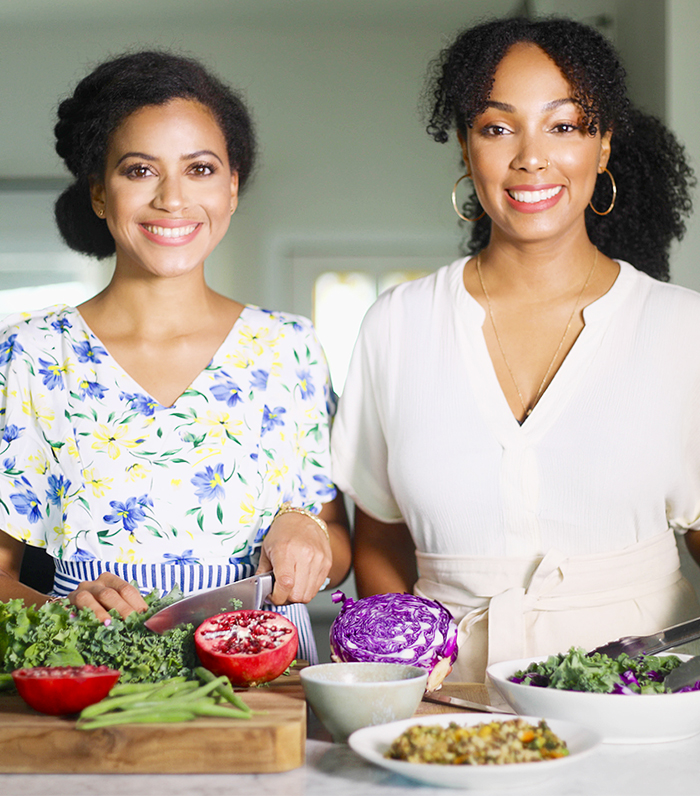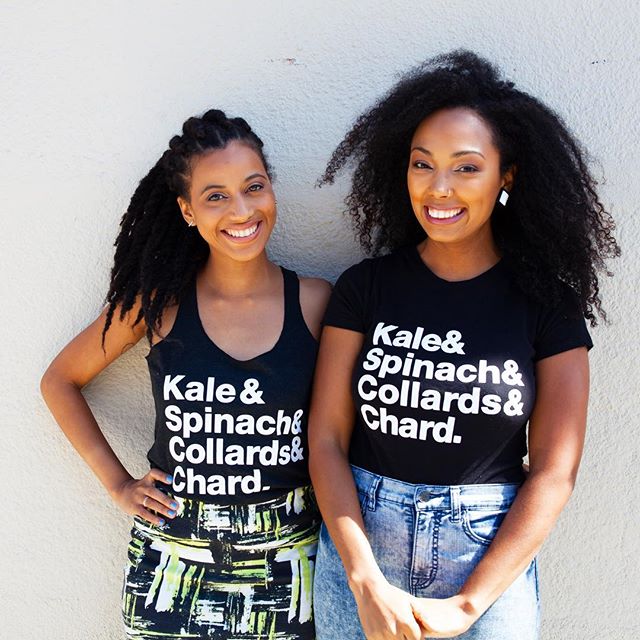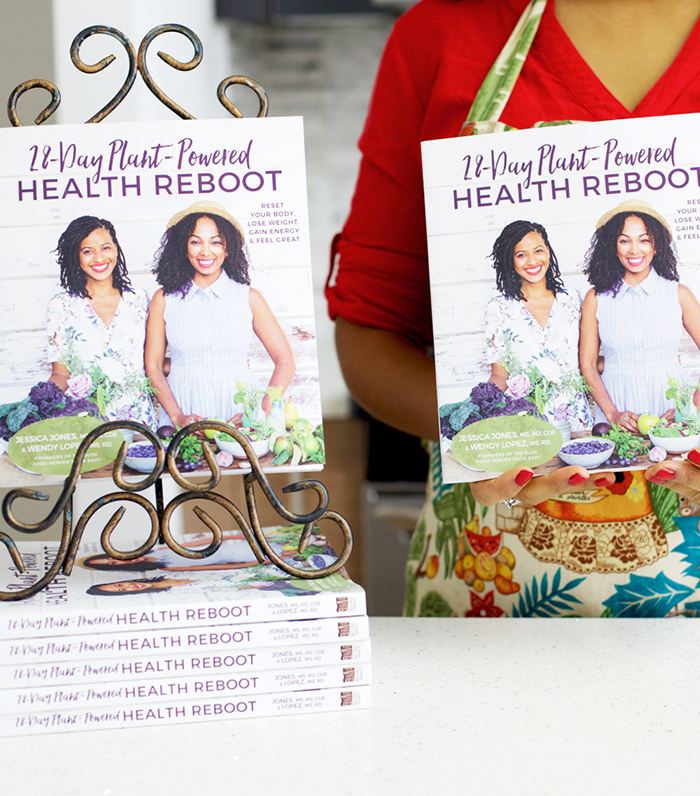These BFF Nutritionists Are Creating a Safe Space for Women of Color

It's unsettling to accept that minority families in low-income neighborhoods have extremely limited access to fresh produce and supermarkets. According to a recent report, only 8% of African American families lived in an area with one or more supermarkets, compared to 31% of white residents. These disparities contribute to the larger issue of higher obesity rates and illnesses within the African American community. Wendy Lopez and Jessica Jones, who are registered dietitians, co-authors of the 28 Day Plant-Powered Health Reboot, certified diabetes educators, and the co-founders of Food Heaven Made Easy, are on a mission to change this.
Inclusivity has been at the forefront of their approach to food since their early days teaching underserved communities of color in the Bronx about nutrition. Unfortunately, the world of wellness leaders is scarce when it comes to women of color. These two have selflessly committed to creating a diverse community of health-first content for their 40,000 Instagram followers and 42,000 YouTube subscribers.
From podcast episodes that address topics plaguing our community like gestational diabetes to sharing how to pick safer beauty and body products, these BFF nutritionists are on the pulse of holistic health. Here's why they're dedicated to changing the landscape of wellness.

THE/THIRTY: What inspired you both to start your platform Food Heaven Made Easy together?
WENDY JESS: Food Heaven Made Easy is a multimedia platform for people who want to learn how to prepare plant-based meals that don’t require hours of laboring in the kitchen. Jess and I first started working together at the farmers markets in the Bronx. At the markets, we provided nutrition education and cooking demonstrations primarily to low-income communities of color. We saw how this education directly translated into community members buying and eating more plant-based foods. This was very inspiring to us. We saw how necessary it was to provide communities with tools and resources for healthier living.
Being the millennials that we are, we started strategizing about ways we could provide this education on a larger platform. We wanted to reach more people, so we started filming cooking videos in Jess’s Brooklyn apartment. We called our webseries Food Heaven Made Easy. Initially, our viewers were a handful of friends and family, but as time passed, we developed an organic and loyal following. As these developments unfolded, we created a website, online store, podcast, and more. Six years later, Food Heaven Made Easy has grown beyond our wildest dreams.
THE/THIRTY: What's your philosophy on healthy eating and the way we should approach food?
W&J: Our philosophy revolves around the importance of developing a positive relationship with food. What does that even mean though? Well, we promote eating foods that have high nutritional value, fight off chronic disease, and promote good health (insert plant-based foods here). We also think there’s a place for the not-so-healthy stuff, if they bring you satisfaction and pleasure (insert glazed doughnuts and onion rings here). Our approach doesn’t involve restriction and focuses more so on the wide range of plant-based foods you can eat.

THE/THIRTY: I love the impact you both made with teaching families how to eat healthy on a budget with foods in line with their culture. That's not an approach you see often in the world of nutrition, so it's amazing that you two fostered a space for that. What was that experience like?
W&J: People want to feel represented whether it’s through media, literature, dance, or, in our case, food.
When you teach people how to incorporate foods that are native to their culture in ways that are healthy and delicious, they are more likely to be motivated to sustain those behaviors.
"Through providing cultural relevant education, people are more likely to improve their diet and lifestyle. They also feel a deeper connection to their food."
THE/THIRTY: Unfortunately there's a cyclical health disparity in communities of color. How are you both working toward improving the idea of nutrition to those who believe they might not have the financial means to eat healthy?
W&J: We aim to develop recipes and nutrition content that are accessible to people who may not have a specialty market in their neighborhood. We stick with simple and basic whole foods you can typically find in the local supermarket and try to stay away from using overpriced ingredients. Through our podcast and nutrition articles, we also provide practical tips for people who want to live a little healthier without breaking the bank.

THE/THIRTY: Thank you both for creating a safe space with your platform and leading women of color even more into the world of wellness. Do you feel a sense of responsibility to represent our underserved community?
W&J: We do. Our communities are disproportionately affected by chronic illness, and it’s important that they see people who look like them educating them. When we saw the lack of diversity in the field, we reached out to and connected with dietitians of color locally to build community. When we see students of color who are seeking guidance, we offer advice and experience as much as possible. As part of our website, we created a section called RD Spotlight, where we feature dietitians doing creative work in the field. Although not exclusive to RDs of color, we make it a point to include diversity in the features we publish. Visibility and representation are extremely important, and we strongly believe it helps with changing the demographics of the profession.
As black dietitians working within a field where we’re wildly underrepresented, we feel a sense of satisfying obligation to change the face of wellness.

THE/THIRTY: Generally, those in low-income environments have an elitist view of healthy eating—especially when it comes to plant-based diets and vegetarianism. Why do you think that is?
W&J: One of the biggest misconceptions about healthy eating is that it's really hard to do. Sure, it may take a little more effort when folks are just getting started or adjusting to this new way of life, but with time they realize that healthy eating can be easily incorporated into a busy lifestyle. We always tell clients that if all of the so-called health foods they are cooking taste disgusting, we need to talk. We try to make people realize that healthy, plant-based dishes should usually taste better than their less healthy counterparts. It just takes a little bit of creativity and an open mind in the kitchen.
THE/THIRTY: What are some tactics to stay on track with healthy eating?
W&J:
- Keep it simple: Plant-based eating shouldn’t be a laborious task that requires an endless number of ingredients. Allow plant-based foods to get the shine they deserve by having their flavors speak for themselves. Now I’m not saying you should eat a bowl of unseasoned beans for dinner. Use plant-based spices and flavor enhancers (think garlic and onion) to make your dishes pop, and aim for a healthy balance of carbs, protein, and fats in each meal. One of our go-to simple plant-based meals is this Black Bean Quinoa Chili Stew topped with avocado. It’s packed with flavor, and lasts for the week! As one of our favorites [Michael Pollan] says, "Eat food. Not too much. Mostly plants.”
- Plan meals ahead of time: Set yourself up for success. Set aside an hour or two each week to do your pre-prepping, chopping, and washing. Think about what meals you’ll be eating for the week, and make sure you go to the market and stock up on ingredients. We personally don’t enjoy cooking three meals a day every day, and we don’t know of many people who do (or who have the time for that). By practicing meal planning, you’ll eat out less, save money, and have a say in what you want your meals to look like.
- Buy in bulk: Buying your staples in bulk is a great way to save time and money at the market. Think nuts, seeds, whole grains, and legumes. You can also purchase frozen fruits and vegetables in bulk, as space in the freezer permits.
Try a few of Wendy Jess's all-time favorite recipes: stuffed avocados, zucchini lasagna, and spicy black bean burgers.

THE/THIRTY: What's your advice for those who want to kick off a healthier lifestyle in the new year?
W&J: When thinking about lifestyle goals, think SMART (specific, measurable, achievable, relevant, and time-bound). The more practical it is, the more chances you have of succeeding. Also, take it easy! Many times, we add on a million things to the "get healthy" list for New Year and end up falling short. Slips happen, and that's okay. Take a moment to think about the kind of lifestyle you want that is both practical and enjoyable.
THE/THIRTY: How can we keep up with Food Heaven?
W&J: We recently launched our Food Heaven Academy, an online platform where we offer courses designed to help people live their healthiest lives. We also have our Food Heaven Podcast, where we talk about all things nutrition and wellness and invite experts in the field to share their insight. We do our annual nutrition retreats as well—in 2017 we did it in Bali, and although we haven’t publicly announced the location for 2018, it’s going to amazing! We also regularly develop content on the site, from recipes to interviews and nutrition articles.
What are some practical and easy ways you approach nutrition-rich food? Share with us in the comments below.
This article is provided for informational purposes only and is not intended to be used in the place of advice of your physician or other medical professionals. You should always consult with your doctor or healthcare provider first with any health-related questions.
